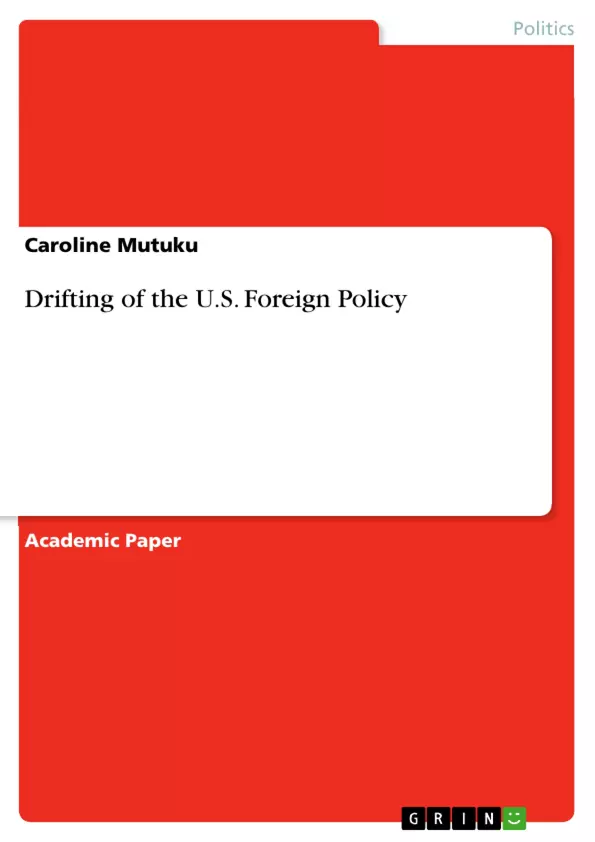Over centuries, the U.S. foreign policy has been experiencing reforms to reflect the status of the nation’s international relations. These reforms have been instrumental to different administrations in the American history in addressing both domestic and international challenges. For instance, the emergence of the Cold War which created tension between the U.S. and its foes including Russia and the Soviet Union prompted Truman’s and Eisenhower’s administrations to adopt the containment policy, in order to counter Soviet aggression. This strategy enabled the U.S. to subvert political, military and economic consequences of Stalinism.
Despite the numerous reforms that have been designed to redefine the U.S. foreign policy in accordance to its domestic and international interests, it is apparent that the country has not yet adopted an ‘all-inclusive’ foreign policy that advances its interests. In the current global order, numerous issues related to the U.S. foreign policy have emerged including the intensification of domestic and international challenges. These changes in the evolving global order seem to have placed the U.S. foreign policy in a state of drifting. Holmes & Inboden (2015) reaffirm that “America's standing in the world, and arguably its influence -- has diminished” (par. 6). This phenomenon can be explained by the current rifts between the United States and its continental allies which are characterized by the rise of anti-U.S. political regimes in Asia, Europe, Africa, and Latin America. This calls for appropriate measures which will redefine U.S. engagement with the international community as it is envisaged in the Obama’s Doctrine, the ‘Grand Strategy’ (Chadha & Muni, 2014). Therefore, this research paper will provide a comprehensive overview on the U.S. foreign policy drift. It will discuss this phenomenon by focusing on the rifts between the United States and other countries which have compromised the effectiveness of the country’s foreign policy.
Inhaltsverzeichnis (Table of Contents)
- Introduction
- Nature of Current U.S. Foreign Policy Approach
- Continental Foreign Policy Drift
- U.S. Foreign Policy Drift in Asia-Pacific
- U.S. Foreign Policy Drift In the Middle East
- U.S. Foreign Policy Drift In Europe
- Approaches for Strengthening U.S. Foreign Policy
- Conclusion
- References
Zielsetzung und Themenschwerpunkte (Objectives and Key Themes)
This research paper examines the drifting of U.S. foreign policy in the current global order, exploring the challenges that have led to a perceived decline in its effectiveness. It delves into the nature of the current U.S. foreign policy approach and analyzes the rifts between the United States and other countries that have contributed to this drift.
- The evolving nature of U.S. foreign policy and its departure from isolationism.
- The impact of international terrorism on U.S. national security and the shift in focus to counterterrorism measures.
- The challenges and consequences of U.S. involvement in peacekeeping missions and the strain on domestic resources.
- The promotion of democratic values and the U.S. role in supporting democratic transitions in various countries.
- The analysis of the U.S. foreign policy drift in specific geographical regions.
Zusammenfassung der Kapitel (Chapter Summaries)
The introduction provides an overview of the historical context of U.S. foreign policy reforms, highlighting the shift from containment to a more entangled approach in the face of evolving global challenges. The chapter on the nature of current U.S. foreign policy approach explores the key objectives of the U.S. government, focusing on national security and the global environment. It examines the impact of international terrorism and the shift in foreign policy focus towards counterterrorism measures. The chapter also discusses the role of peace-keeping missions and their economic implications, as well as the promotion of democratic values in U.S. foreign policy.
Schlüsselwörter (Keywords)
The key concepts and themes explored in this paper include: U.S. foreign policy, international relations, global order, national security, terrorism, counterterrorism, peace-keeping missions, democratic values, foreign policy drift, continental allies, Asia-Pacific, Middle East, Europe, and Obama's Doctrine.
Frequently Asked Questions
What is meant by the "drifting" of U.S. foreign policy?
The term refers to a state where U.S. foreign policy appears less effective or consistent, characterized by diminishing global influence and growing rifts with traditional continental allies.
How did the Cold War influence historical U.S. policy?
During the Cold War, administrations under Truman and Eisenhower adopted the containment policy to counter Soviet aggression and subvert the political and economic consequences of Stalinism.
What are the current challenges for U.S. policy in the Asia-Pacific region?
The policy faces challenges from the rise of anti-U.S. political regimes and evolving regional interests that complicate traditional alliances and diplomatic strategies.
How does international terrorism impact U.S. national security policy?
International terrorism has prompted a significant shift toward counterterrorism measures, redefining engagement with the international community and national security priorities.
What is the "Grand Strategy" mentioned in the research?
The Grand Strategy, often associated with the Obama Doctrine, envisages a redefinition of U.S. engagement with the international community to better advance domestic and international interests.
- Citar trabajo
- Caroline Mutuku (Autor), 2018, Drifting of the U.S. Foreign Policy, Múnich, GRIN Verlag, https://www.grin.com/document/432161



